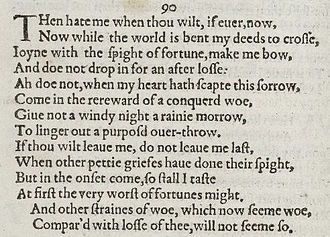Poem by William Shakespeare
| «» Sonnet 90 | |||||||
|---|---|---|---|---|---|---|---|
 Sonnet 90 in the 1609 Quarto Sonnet 90 in the 1609 Quarto | |||||||
| |||||||
Sonnet 90 is one of 154 sonnets written by the English playwright and poet William Shakespeare. It is a member of the Fair Youth sequence, in which the poet expresses his love towards a young man.
Synopsis
The sonnet continues the themes of the breakdown of the relationship between the youth and the poet. The poet suggests that the youth should reject him now that everyone seems to be against him. The poet exhorts the youth not to wait to reject him until after these other, less important, sorrows have passed. At least if he is rejected now, his other problems will pale into insignificance.
Structure
Sonnet 90 is an English or Shakespearean sonnet. The English sonnet has three quatrains, followed by a final rhyming couplet. It follows the typical rhyme scheme of the form, ABAB CDCD EFEF GG, and is composed in iambic pentameter, a type of poetic metre based on five pairs of metrically weak/strong syllabic positions. The 10th line exemplifies a regular iambic pentameter:
× / × / × / × / × / When other petty griefs have done their spite, (90.10)
Lines 5 and 7 have a final extrametrical syllable or feminine ending. Line 7 may also be read as exhibiting another common metrical variation, the initial reversal:
/ × × / × / × / × / (×) Give not a windy night a rainy morrow, (90.7)
- / = ictus, a metrically strong syllabic position. × = nonictus. (×) = extrametrical syllable.
Initial reversals also occur in lines 3 and 6, and potentially 2. A potential mid-line reversal occurs in line 11 ("so shall").
Notes
- Pooler, C Knox, ed. (1918). The Works of Shakespeare: Sonnets. The Arden Shakespeare . London: Methuen & Company. OCLC 4770201.
References
- First edition and facsimile
- Shakespeare, William (1609). Shake-speares Sonnets: Never Before Imprinted. London: Thomas Thorpe.
- Lee, Sidney, ed. (1905). Shakespeares Sonnets: Being a reproduction in facsimile of the first edition. Oxford: Clarendon Press. OCLC 458829162.
- Variorum editions
- Alden, Raymond Macdonald, ed. (1916). The Sonnets of Shakespeare. Boston: Houghton Mifflin Harcourt. OCLC 234756.
- Rollins, Hyder Edward, ed. (1944). A New Variorum Edition of Shakespeare: The Sonnets . Philadelphia: J. B. Lippincott & Co. OCLC 6028485. — Volume I and Volume II at the Internet Archive
- Modern critical editions
- Atkins, Carl D., ed. (2007). Shakespeare's Sonnets: With Three Hundred Years of Commentary. Madison: Fairleigh Dickinson University Press. ISBN 978-0-8386-4163-7. OCLC 86090499.
- Booth, Stephen, ed. (2000) . Shakespeare's Sonnets (Rev. ed.). New Haven: Yale Nota Bene. ISBN 0-300-01959-9. OCLC 2968040.
- Burrow, Colin, ed. (2002). The Complete Sonnets and Poems. The Oxford Shakespeare. Oxford: Oxford University Press. ISBN 978-0192819338. OCLC 48532938.
- Duncan-Jones, Katherine, ed. (2010) . Shakespeare's Sonnets. Arden Shakespeare, third series (Rev. ed.). London: Bloomsbury. ISBN 978-1-4080-1797-5. OCLC 755065951. — 1st edition at the Internet Archive
- Evans, G. Blakemore, ed. (1996). The Sonnets. The New Cambridge Shakespeare. Cambridge: Cambridge University Press. ISBN 978-0521294034. OCLC 32272082.
- Kerrigan, John, ed. (1995) . The Sonnets ; and, A Lover's Complaint. New Penguin Shakespeare (Rev. ed.). Penguin Books. ISBN 0-14-070732-8. OCLC 15018446.
- Mowat, Barbara A.; Werstine, Paul, eds. (2006). Shakespeare's Sonnets & Poems. Folger Shakespeare Library. New York: Washington Square Press. ISBN 978-0743273282. OCLC 64594469.
- Orgel, Stephen, ed. (2001). The Sonnets. The Pelican Shakespeare (Rev. ed.). New York: Penguin Books. ISBN 978-0140714531. OCLC 46683809.
- Vendler, Helen, ed. (1997). The Art of Shakespeare's Sonnets. Cambridge, Massachusetts: The Belknap Press of Harvard University Press. ISBN 0-674-63712-7. OCLC 36806589.
| Shakespeare's sonnets | ||||||||
|---|---|---|---|---|---|---|---|---|
| "Fair Youth" sonnets |
|  | ||||||
| "Dark Lady" sonnets |
| |||||||
